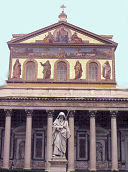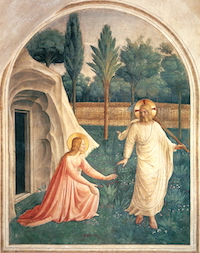» Enjoy our Liturgical Seasons series of e-books!
Communion Antiphon, Col 3:1-2:
If you have risen with Christ, seek the things that are above, where Christ is seated at the right hand of God; mind the things that are above, alleluia.
The first eight days of the Easter season form the Easter Octave and are celebrated as solemnities of the Lord. Each day is another little Easter. The Alleluia verse is repeated throughout the octave: "This is the day the Lord has made; let us rejoice and be glad. Alleluia!"
Meditation for Tuesday within the Octave of Easter: Mary Magdalen
At the tomb of the risen Savior, Mary was made an apostle: “Go to My brethren [the apostles] and say to them: I ascend to My Father and to your Father.” The liturgy lingers about the tomb today with the penitent Magdalen, to whom Christ first appeared after appearing to His mother. At Mass the Lord comes to us as He came to Mary at the tomb.
2. “Mary stood at the sepulchre without, weeping. Now as she was weeping, she stopped down and looked into the sepulchre; and she saw two angels in white…. They said to her: Woman, why weepest thou? She saith to them: Because they have taken away my Lord, and I know not where they have laid Him. When she had thus said, she turned herself back and saw Jesus standing; and she knew not that it was Jesus.” St. Gregory thus comments on this touching incident:
Mary Magdalen, who had been a sinner in the city, by loving the Truth washed away the stains of her crime with her tears….”Many sins are forgiven her, because she has loved much” (Luke 7:47). She who formerly had remained cold in her sin, afterwards became fervent with holy love….Of the disciples [who had come to the tomb] it is written: “The disciples therefore departed again to their home” (John 20:10). And then is added: “But Mary stood at the sepulchre without, weeping.” What a great love glows in the heart of this woman, who did not leave the tomb even though the disciples left!...She sought Him in tears, and inflamed with the fire of love, she burned with yearning for Him whom she thought had been taken away. Thus it happened that she alone then saw Him, she who alone had remained to seek Him.
The former sinner, the penitent, is the chosen one of the Lord. She is allowed to see Him because she had loved much and because she remained to seek Him. The sign of real virtue is perseverance. “He that shall persevere to the end, he shall be saved” (Matt 24:13). Would that we had such a longing for Christ as Magdalen had! Would that we could love as she loved! Our hearts are filled with worldly desires, and we have little room left for Christ. We are so attached to the foolishness and emptiness of the world that we have no love for Christ.
“Why weepest thou? Whom seekest thou?” Christ asks Magdalen. She thinks that it is the gardener addressing her, and she says to Him, “Sir, if thou hast taken Him hence, tell me where thou hast laid Him and I will take Him away. Jesus saith to her: Mary. She, turning, saith to Him: Rabboni (which is to say, Master).” She then casts herself at His feet, seeking to kiss and embrace them. Now she thinks she will never lose Him whom she has found. Christ does not permit this expression of her love. She has more important duties now. “Go to My brethren and say to them: I ascend to My Father” (Gospel). Mary obeys at once. She tears herself away from Him who she loves and brings the glad news to the apostles.
3. Today the Lord appears to us in the Mass and calls us by name as He once called Magdalen. He called us by this name first when we were baptized. Today we should come to Communion with a longing similar to Mary’s.
When we have recognized Him and received Him in Holy Communion, we also become apostles. Our mission is to love our neighbor. By our zeal in the practice of fraternal charity we give testimony to the world that Christ is risen and that He continues to live and work in us, the members of His mystical body. Having done penance, Magdalen now knows only the joy of possessing Jesus. We must share her joy.
—Benedict Baur, OSB, The Light of the World
Meditation—Christ Jesus, Our Elder Brother
What does Jesus Himself say to Magdalen when already in the glory of His Resurrection? “Go to My brethren”: Vades ad fratres meos. And how great is His “fraternity”! God as He is, this Only-begotten Son takes upon Himself our infirmities, He makes Himself responsible for our sins, in order to be like unto us; and restore to us the possession of the eternal Kingdom of Life with the Father.
For it is to the Father that Jesus leads us. Listen to what He says on leaving His disciples: “I ascend to My Father and to your Father, to my God and to your God”; the Word has come down from Heaven to take upon Himself our flesh and to redeem us; His work accomplished, He ascends to Heaven, but He does not ascend alone; He virtually takes with Him all who believe in Him.
And why?
In order that—in Him again—the union of all with the Father should be accomplished: Ego in eis et tu in Me. Is not this Jesus’ supreme prayer to the Father? “That I may be in them, O Father—by My grace—as Thou in Me, that they may contemplate, in the Divinity, the glory which Thou has given Me.”
—Dom Columba Marmion, Christ, the Ideal of the Monk

Tuesday in the Octave of Easter
Station with San Paolo fuori le mura (St. Paul Outside the Walls):
At Rome, the Station for today is in the basilica of St. Paul Outside the Walls. The church is impatient to lead her white-robed newly baptized to the Apostle of the Gentiles. Though he is not the foundation of the Church, he is the companion of Peter's labors in Rome, his fellow-martyr, and the preacher of the Gospel to the Gentiles.
For more on San Paolo fuori le mura, see:
- Churches of Rome Info
- Rome Art Lover
- Roman Churches
- PNAC
- Aleteia
- Station Church
- The Catholic Traveler
For further information on the Station Churches, see The Stational Church.






